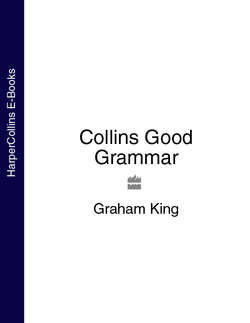Читать книгу Collins Good Grammar - Graham King - Страница 13
The inner workings of the classic sentence
ОглавлениеTry to think of a sentence as a combination of two units:
The subject – What it is
The predicate – what we’re saying about it
Here are some simple examples:
| SUBJECT | PREDICATE |
| My | word! |
| Your book | is over there. |
| Dr Smith | will see you tomorrow. |
The subject of a sentence does not have to precede the predicate. Every day we’ll read hundreds of sentences in which the predicate precedes the subject:
| PREDICATE | SUBJECT |
| It gradually became apparent that it was | the odour of death. |
| Over the horizon appeared | an immense armada. |
Sometimes the subject of a sentence can be buried, or at least disguised. What are the subjects in these sentences?
| A | How many more times must we do this long journey? |
| B | You should see how my friend Jeremy deals with pushy salesmen. |
| C | Take this load of rubbish to the shop for a refund. |
A is what is called an interrogative sentence which often transposes subject and predicate. If you think carefully about this example you’ll probably conclude that the only possible candidate for the subject is we (We must do this journey how many more times?).
If you flushed out the subject in A you should have little trouble with example B, which is a similar construction. The subject here is my friend Jeremy.
Example C has what you could call a ‘ghost’ subject. It is an imperative sentence in which the subject is implied. What the sentence is really doing is commanding someone to undertake a task:
(Will you please) Take this load of rubbish to the shop for a refund.
or (You) Take this load of rubbish to the shop for a refund.
If you follow the logic of this you’ll see that the subject here is You; the sentence itself is the predicate.
Quite often both the subject and predicate of a sentence can consist of two or more parts, or compounds:
If you can digest all this you can put it at the back of your mind but you will find it a helpful guide in sentence construction. It will help you to know, for instance, that in a long sentence such as James, my close friend and the grandson of the French artist Bernard Agate, is moving to New York, that the portion in bold is the subject and is moving to New York is the predicate, while in James is moving next month to the place he’s always wanted to be – New York, the single word James is the subject and the rest is the predicate.
The predicate can be a bit of a puzzle, mainly because it can consist of just a single verb or a number of elements that describe, modify or supply extra information. We make sense of this by recognising a direct and indirect object. In the sentence –
James is moving to New York.
– James is the subject and the rest is the predicate. The direct object of the predicate is New York. It isn’t actually doing anything, but is having something done to it. If, however, the sentence expands a little –
James told me he was moving to New York.
– we now have not only a direct object (New York) but an indirect object – me.
